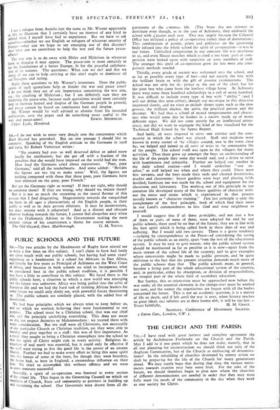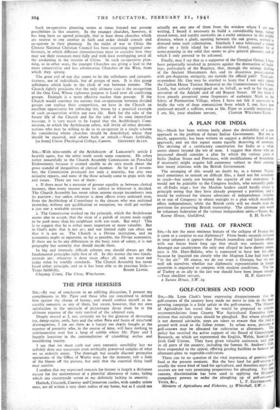THE CHURCH AND THE PARISH
have read with great interest and complete agreement the article by Archdeacon Fosbrooke on the Church and the Parish. May I add to it one point which he does not make, namely, that in all our planning for reconstruction we should think not only of the Anglican Communion, but of the Church as embracing all denomina- tions? In the rebuilding of churches destroyed by enemy action we shall be preparing for the life of the Church for many generations ahead. We may surely hope that during that time the various move- ments towards reunion may bear some fruit. For the sake of the future, we should therefore begin to plan now where the churches of different denominations are needed in order that they may most fully meet the needs of the community in the day when they work as one society for Christ.
Such co-operative planning seems at times beyond our present possibilities in this country. In the younger churches, however, it has long been an agreed principle, that at least those churches which are nearest to one another in faith and order should consult and co-operate in their planning. In the midst of war in China the Chinese National Christian Council has been organising regional con- ferences, in which different denominations meet to consider how they may use their resources most fully and with least overlapping amid all the awakening in the interior of China. In such co-operative plan- ning, as in other ways, the younger Churches are giving a lead to the more conservative and less adventurous Churches of the West, from which they sprang.
The great evil of our day seems to be the selfishness and competi- tiveness, not of individuals, but of groups of men. It is this group selfishness which leads to the clash of war between nations. The Church rightly proclaims that the only ultimate cure is the recognition of the One God, Whose righteous purpose is Lord over all conflicting groups. Example is a more effective teacher than precept. If the Church would convince the nations that co-operation between divided groups can replace their competition, we have in the Church an excellent opportunity for enforcing this lesson by a practical example of such co-operation within our own life. Both for the sake of the future life of the Church and for the sake of its own immediate message, it is very much to be Loped that the Archbishop's Com- mission, to which the Archdeacon refers, will invite all other denomi- nations who may be willing to do so to co-operate in a single scheme for considering where churches should be demolished, where they should be repaired, and where built or rebuilt —Yours faithfully,
[as from] Union Theological College, Canton. GEOFFREY ALLEN.































 Previous page
Previous page